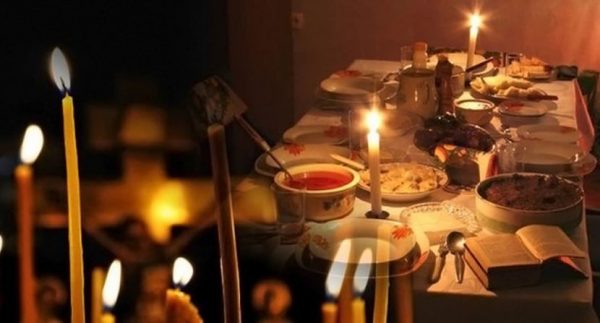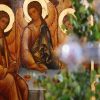David Brooks once published an opinion piece on attention itself, which is the human capacity of self-awareness in guiding and shaping one’s personal life. He writes: “Control of attention is the ultimate individual power. People who can do that are not prisoners of the stimuli around them. They can choose from the patterns in the world and lengthen their time horizons. This individual power leads to others. It leads to self-control, the ability to formulate strategies in order to resist impulses. We would all rather our children be materially poor with self-control than rich without it.” Insightful words of wisdom!
The saints have known very well what Brooks is talking about. Their whole spiritual struggle revolved around the gathering and purifying of autognosia which is self-knowledge or self-awareness. They called this holy task, a veritable invisible war, by many names. It is nepsis, a temperance of the body and a sober-mindedness of the soul. It is an alert wakefulness and guarding of the heart and the mind (phylake kardias/noos). It is a kind of recovery of senses, a kind of peace between the conscience and the deep self by heeding the pure promptings of conscience and by presenting the self in prayer to God. It is true worship, a striving in all things to keep God in prayerful remembrance, to guard the self from evil thoughts and actions, to walk the narrow way of Christ with faith and courage. It is attention to the spiritual inner vision itself, an ongoing watchfulness and prayerfulness, guarding one’s inner world as one would guard one’s own eyes, guarding and nurturing the inner treasure of grace, yet all the while being faithful to one’s daily tasks with seriousness, joy and hope in the Lord.
The pilgrimage of Great Lent has always provided a golden opportunity for inner spiritual focus, the concentration of mind, will and emotions toward the renewal of life in Christ. All times and seasons are holy to God, and precious to us, to live with joy and gratitude. But all too often we find ourselves distracted, confused and aimless or frustrated in a vortex of demands and responsibilities. Unable to resist impulses, we allow sin to touch us and to defeat us. We give ourselves over to the world that is separated from God “and everything that belongs to the world—what sinful self desires, what people see and want, and everything in this world that people are so proud of” (1 John 2:16, Today’s English Version). Great Lent gives us the opportunity to achieve, with God’s grace, inner spiritual attention through practical spiritual disciplines, self-examination and the re-evaluation of priorities. It thus helps to grow and deepen our life in Christ.
St. Paul writes: You know what hour it is, how it is full time now for you to wake from sleep . . . the night is far gone, the day is at hand . . . cast off the works of darkness and put on the armor of light. Put on the Lord Jesus Christ (Romans 13:11-14). Every hour is the hour of decision. Every hour brings choices that determine not only tomorrow but my eternal destiny. Every hour of every day has in it the seed of light or darkness, of life or death. Every hour offers possibilities of spiritual vigilance, genuine faithfulness, quiet joy, inner peace, and right decisions leading to thoughtful actions. But because of my forgetfulness, carelessness, spiritual laziness, or anger and frustration with the world as I encounter it, not every hour is the hour of spiritual mindfulness and measured choices, not every hour is an opportunity for authentic life received as a gift from God.
Thus, the call of Lent: Awake from sleep! Take up the armor of light! Put on Christ! The question to my soul is “Are you spiritually alive or asleep? If alive, thank the Lord and continue to grow in Him. If asleep, when do you plan to awake? If not now, during the journey of Great Lent, then when?” May the Lord help me to cast off the darkness that is in me, to embrace Him through faith as my Savior and Lord, that I might through His grace live my life in the joy and newness of His presence and power.
What’s the whole point of Lent? It is nothing less than thorough spiritual conversion, the inward change of the will, the mind, and the heart that leads to tangible evidence of change in daily life, speech and conduct. This is exactly what we all need, to be not only baptized Orthodox Christians but also convertedOrthodox Christians. What a paradox that we may have baptized but not always converted Orthodox Christians, and yet, in too large a measure, it is true. But you might ask, conversion from what to what? For some it may be conversion from anger and frustration to a sense of peace with God and with self. For others it may be conversion from self-satisfied and set ways, and from the presumption to think that they know all that is really worth knowing to a humble awareness of our own blindness to how engulfed they may be to the values and ways of this world. For still others it may mean freedom from the agonizing struggle of conscience over such things as overeating, gossiping, family squabbles, and secret habits that burden the soul with guilt.
What’s the point of Lent? It is not the patience to endure many and long services. Not the minutiae of fasting. Not sad faces. Not wallowing in guilt. Yes, of course, we need the publican’s awareness of personal sin crying out “O God, be merciful to me, a sinner.” We need the Prodigal’s focus on active repentance and the courage to return to our Father. We certainly need control of our intake of food and drink as remembrance that our true life comes from God. And we need strength to fast from even more important things such as an evil tongue, evil thoughts and evil actions. Too, we need lots of regular prayer, both private and together, to put ourselves in the presence of God and to open our hearts to His forgiveness and healing. We need to become students of the Scriptures. We need many other “religious” things as well, but all these things have but one purpose: a deeper change and conversion to Christ and the new life in Christ.
Behind everything lies the challenge of focusing attention, turning on the switch, making conscious decisions, welcoming the spiritual disciplines of prayer, fasting and works of mercy, and taking specific actions to complete the pilgrimage of Great Lent with integrity and a sense of spiritual growth. Our first priority is worship together with others. Will you take in hand the service book, keep your attention on the words and meaning of the prayers, chant the hymns along with the congregation, and thus truly worship God regularly as our first priority? Or do you think of worship as optional, easily to be put aside when other things seem to be more urgent or necessary?
Do you own a Bible? Have you ever read carefully the Gospel of John, perhaps the most important book in the Bible? Do you know the story of the rise and growth of the early Church recounted in the Book of Acts? What attitudes and good works do you need to work on during Lent? Love? Patience? Forgiveness? Controlling the tongue? Helping an elderly person? Encouraging a person who may be depressed? Committing part of your time to a soup kitchen as a volunteer? Persisting in prayer on behalf of someone who may be in trouble? Befriending a lonely person? You cannot do all of these things but can choose the most suitable to your circumstances.
Great Lent is a period of focused spiritual attention and self-discipline for the renewal of the life of faith. Any of the above disciplines that we commit to ought to be done to honor and serve Christ who is at the center of all that we seek to be as Christians. In this journey of Lent, let our hearts and minds turn to Him with single-minded spiritual attentiveness, to believe in Him, embrace Him, love Him, follow His ways, worship Him and so live in Him. “Behold, I stand at the door and knock: if any one hears my voice and opens the door, I will come” (Revelation 3:20). “He who loves me will keep my word, and my Father will love him, and we will come to him and make our home with him” (John 14:24). “Come to me, all who labor and are heavy laden, and I will give your rest. Take my yoke upon you, and learn from me; for I am gentle and lowly in heart, and you will find rest for your souls” (Matthew 11:28-29).
DISCIPLINES OF LENT:
*WORSHIP every Sunday.
*PRAY regularly and sincerely.
*MEDITATE on your life and God.
*READ the Scriptures.
*FAST by using moderation in food, drink
and entertainment.
*PREPARE for Confession and Holy
Communion.
PRACTICE Christian love, forgiveness,
and service to others.
REFRAIN from gossip, criticism of others,
and from talking about personal exploits.
GREAT LENT is for growing in greater
love for God and all people.
LEVELS OF FASTING:
STRICT FASTING: No meat and dairy
products throughout Lent and Holy Week.
MODERATE FASTING: The above during
the first week, the third week, and Holy Week,
plus every Wednesday and Friday.
MINIMAL FASTING: The above Wednesdays
and Fridays, and Holy Week.
WHEN FASTING we take into consideration age,
health, and circumstances.
BENEFITS OF FASTING:
1. Teaches us self-discipline
2. Leads to spiritual focusing on God
3. Controls our sinful passions
4. Makes prayer more effective
5. Gives us greater moral alertness and
clarity of mind
6. Reminds us of those who are hungry and
suffer
7 Recalls the fasting of Jesus, the saints, and
faithful Christians throughout the ages.
8. Helps us to live by the teachings of Christ
9. Contributes to our physical health
10. Makes us think about the right diet
throughout the year.
LENTEN PRAYER:
O Lord and Master of my life:
Grant me not a spirit of sloth, vain curiosity, love of power and idle talk.
But grant me a spirit of watchfulness, humility, patience and love.
Yes, Lord and King, grant me to see my own faults and not to judge my brothers and sisters.
For You are blessed now and forever. Amen.
Prayer of St. Ephraim the Syrian

















